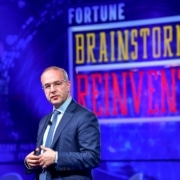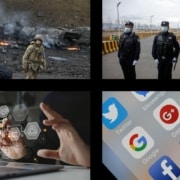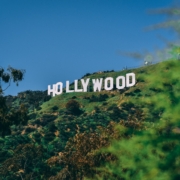Want to Take a Stand for Free Expression, Hollywood? Copy Sony

The latest Spider-Man movie has grossed more than $1.8 billion worldwide since it opened last December—not too shabby even by the superhuman standards of the Marvel franchise.
Spider-Man: No Way Home has achieved this impressive figure even though Sony Pictures, the movie’s distributor, decided to forgo showing it in China, which during the pandemic became the world’s number one market for Hollywood blockbusters. Sony sacrificed what would probably have been hundreds of millions of dollars in additional revenue for what seem to be the most admirable of reasons: It stood up to Chinese censorship.
Sony’s decision to reject censors’ demands in the latest Spider-Man movie is the rare instance where a major studio has been willing to stand up to China.
What caught the censors’ attention in the most recent Spider-Man installment was the film’s climactic scene set atop the Statute of Liberty. According to recent news reports, Chinese censors demanded that Sony remove all scenes showing one of the most familiar symbols of American liberty. When the company refused, the censors proposed reducing the number of shots showing the statue and obscuring its features in any remaining scenes. When Sony rejected this alternative, the government declared that the film could not be shown in China. Sony did not respond to my request for its comment on its interactions with the Chinese government.
The episode illustrates how aggressive Chinese bullying of the U.S. movie industry has become. The government in Beijing is no longer just policing what it sees as negative characterizations of Chinese officials and politics. It is also trying to erase images of symbols of freedom in the United States.
Sony, a U.S.-based subsidiary of Japan’s Sony Group, could not have taken its decision lightly. The last Spider-Man film, Spider-Man: Far From Home, generated more than $200 million in box office revenue in China in 2019. With record income in the last year, Sony can weather the foregone Chinese revenue from Now Way Home. But for Sony and other movie distributors, China’s increasingly aggressive campaign to restrict what Chinese audiences see poses mounting future challenges.
Chinese censors have been tightening control on imported movies for a quarter century, leveraging the country’s growing share of global box office revenues to intimidate Hollywood production companies and distributors.
In, America Second: How America’s Elites are Making China Stronger, Isaac Stone Fish describes how in 1997, the Chiinese government demanded a total rewrite of the script for the James Bond film Tomorrow Never Dies. The original storyline involved China’s takeover of Hong Kong. When the government objected, the producers ditched that script and ordered the writers to generate a new one. The revised story focused on a mad press baron who attempts to start a war between China and Britain to improve his media ratings.
The Bond rewrite marked a turning point and, since then, Chinese censorship of U.S.-produced films has become routine. Sony’s decision to reject censors’ demands in the latest Spider-Man movie is the rare instance where a major studio has been willing to stand up to China.
Meanwhile, China has invested significant resources to build a thriving film industry of its own where the political constraints on Chinese filmmakers are clear. In 2005, China’s leader at the time, Hu Jintao, left little room for flexibility when he publicly warned that “all those working with China’s film industry should stick to the correct political direction all the time.”
The swift growth of Chinese moviegoing has strengthened Beijing’s ability to intimidate the U.S. film industry. In 2000, China’s annual box office amounted to less than $20 million. Last year, the take totaled $7.3 billion, which was down from a pre-pandemic high of $9.2 billion in 2019. (U.S. ticket sales last year totaled $4.5 billion.) And though Hollywood films raked in 30 percent to 50 percent of Chinese box office revenue a decade ago, its share had shrunk to just 12 percent last year.
Subscribe to the Ethical Systems newsletter
The rise of homegrown Chinese competition has put greater pressure on Hollywood to comply with Chinese restrictions or preempt them by anticipating what might offend Beijing. U.S.-based production companies now routinely decline even to consider making films that come near the line of what Chinese censors are likely to reject. This means that Chinese censors are effectively dictating not only limits on what Chinese audiences are allowed to see, but indirectly curtailing the artistic freedom of filmmakers producing movies for audiences in the U.S. and other parts of the world.
Chinese officials began making their expectations known years ago. In 2012, Zhang Xun, then president of the state-owned China Film Co-Production Corporation, told a group of Hollywood executives, “We want films that are heavily invested in Chinese culture, not just one or two shots.” Punctuating the point, she added, “We want to see positive Chinese images.”
The Americans got the message. In 2013, the Motion Picture Association of America publicly acknowledged that “the adjustment of some of our films for different world markets is a commercial reality, and we recognize China’s right to determine what content enters their country.” Fish describes this history in detail in his recent book America Second.
Over the last four years, President Xi Jinping of China has imposed increasingly draconian restrictions on free expression and human rights. As part of his consolidation of power in March 2018, Xi transferred oversight of the relationship between Hollywood and the Chinese government from the State Administration of Press, Publication, Film and Television to the State Propaganda Department.
Reporting on this reorganization, Xinhua, the official Chinese news service, explained euphemistically that it reflected the “especially important role of cinema in propagating ideas and in cultural entertainment.”
Looking ahead, Hollywood movie executives need to work together to develop practical and principled guidelines for addressing official censorship abroad. While the Chinese government leads the way in censoring foreign films, other authoritarian governments likely will follow its lead in turning movies into propaganda vehicles.
Sony has taken a useful first step by signaling that it will not edit the Statue of Liberty out of the latest Spider-Man film. Now other companies need to follow Sony’s lead and refuse to capitulate, as China’s censors become increasingly extreme in their demands. One hopes that Hollywood’s collective defense of artistic freedom will send a powerful message to China and to the rest of the world.
Michael Posner is the Jerome Kohlberg professor of ethics and finance at NYU Stern School of Business and director of the Center for Business and Human Rights. Follow him on Twitter @mikehposner.
Lead image: AntMan3001 / Flickr
Reprinted with permission from Forbes.









